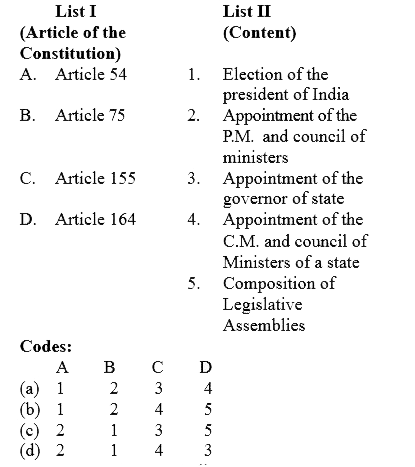Which of the following is/are the principal features(s) of the Government of India Act, 1919 ?
1. Introduction of dyarchy in the executive government of the provinces
2. Introduction of separate communal electorates for Muslims
3. Devolution of Legislative authority by the centre to the provinces
Select the correct answer using the codes given below:
1 only
2 and 3 only
1 and 3 only
1, 2 and 3
The correct Answer is:C
Step by step video, text & image solution for Which of the following is/are the principal features(s) of the Government of India Act, 1919 ? 1. Introduction of dyarchy in the executive government of the provinces 2. Introduction of separate communal electorates for Muslims 3. Devolution of Legislative authority by the centre to the provinces Select the correct answer using the codes given below: by General Knowledge experts to help you in doubts & scoring excellent marks in Class 14 exams.
Updated on:21/07/2023Similar Questions
Which of the following was/were the main feature(s) of the Government of India Act, 1919?
1. Introduction of separate electorates for Muslims
2. Devolution of legislative authority by the Centre to the Provinces
3. Expansion and reconstitution of Central and Provincial Legislatures
Select the correct answer using the code given below:
View SolutionWhich of the following list 1 with list II and select the correct answer using the codes given below the list:

View Solution
Knowledge Check
Which of the following was/ were the main feature(s) of the Government of India Act, 1919 ?
1. Introduction of separate electorates for Muslims
Devolution of legislative authority by the centre
3. Expansion and reconstitution of Central and Provincial Legislatures
Select the correct answer using the code given below:A2 onlyB1 and 3C3 onlyD2 and 3Which of the following is/are coastal erosional feature(s)?
1 Notch
2 Sea Arch
3 Cliff
4 Hook
Select the correct answer using the code given belowA1,2 and 3B2,3 and 4C2 and 3 onlyD1 onlyConsider the following statements:
Some of the main features of the Government of India Act, 1935 were the:
1. Abolition of diarchy in the Governor's provinces.
2. The power of the Governors to veto legislative action and to legislate on their own.
3. Abolition of the principal of communal representation.
Which of the statements given above is/are correct?A1 onlyB1 and 2C2 and 3D1, 2 and 3
The government can influence private sector expenditure by
1. taxation
2. subsidies
3. macroeconomic policies
4. grants
Select the correct answer using the code given below.
View SolutionWhich one of the following is NOT a feature of the Government of India Act of 1935 ?
(a) Diarchy at the centre as well as in the provinces
(b) A bicameral legislature
(c) Provincial autonomy
(d) An All India Federation
View SolutionWhich of the following is /are the function /functions of the Finance Commission of India ?
1 Distribution of the taxes which are divisible between the Union and the States
2. To recommend the principles which should govern the grant -in -aid of the revenues of the States out of the Consolidated Fund of India Select the correct answer using the code given below -
View SolutionWhich of the following is/are the component/components of the Integrated Power Development Scheme lauched by the Government of India recently ?
1. Strengthening of sub-transmission and distribution networks in the urban areas
2. Metering of distribution transformers/feeders/consumers in the rural areas
Select the correct answer using the code given below
View SolutionWhich of the following features of the Indian Government system are the essential features of the parliamentary Government system?
1. Presence of nominal and real executives
2. Membership of the ministers in the legislature
3. Separation of powers between the Union and State government
4. Independent judiciary system
Select the correct answer using the codes given below:
View Solution
